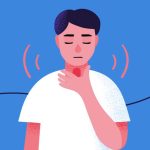Have you ever experienced a sudden and inexplicable tightening sensation in your throat, making it hard to swallow? You’re not alone. Many people have reported feeling like they’ve got a lump in their throat, which can be incredibly frustrating and uncomfortable.
Can Anxiety Cause Your Throat to Feel Swollen?
If you’re wondering whether anxiety could be the culprit behind your throat woes, you’re on the right track. Research has shown that there is a strong link between anxiety and physical symptoms like swelling and discomfort in the throat. In this post, we’ll delve into the relationship between anxiety and throat tightness, exploring what causes it and how to alleviate these uncomfortable sensations.
The Anatomy of Anxiety-Related Throat Symptoms
When we experience anxiety, our body’s “fight or flight” response is triggered. This triggers a cascade of physiological changes that can manifest in various ways, including physical symptoms like throat tightness. The tightness and swelling you feel in your throat are often related to the constriction of the esophagus and the muscles surrounding it.
According to Dr. Frank Lipman, an integrative medicine specialist, “When we’re under stress or anxiety, our body’s response is to constrict the blood vessels and tighten the muscles, which can cause a sensation of tightness in the throat.” This constriction can be exacerbated by factors such as breathing patterns, posture, and even emotional state.
In the next section, we’ll explore the specific physiological mechanisms at play when anxiety causes throat tightness, including how it affects your nervous system and hormone production. Stay tuned to learn more about how to manage these uncomfortable symptoms and regain control over your body!
As we explored earlier, anxiety can indeed cause your throat to feel swollen and hard to swallow. But what exactly happens physiologically when this occurs? To better understand the connection between anxiety and throat tightness, let’s dive into the specifics.
The Physiological Mechanisms at Play
When we experience anxiety, our body’s “fight or flight” response is triggered, releasing stress hormones like cortisol and adrenaline. These hormones stimulate the sympathetic nervous system, which prepares our body for action by increasing heart rate, blood pressure, and respiratory rate.
This physiological response can cause constriction of the esophageal muscles, leading to a sensation of tightness or swelling in the throat. Additionally, the increased tension in the throat muscles can lead to discomfort when swallowing, making it feel like there’s a lump or obstruction present.
Research has shown that this constriction is often accompanied by changes in breathing patterns and posture. For example, people experiencing anxiety may breathe more shallowly or rapidly, which can further exacerbate the constriction of the esophageal muscles. This self-reinforcing cycle can create a feedback loop, perpetuating the sensation of throat tightness.
It’s essential to note that these physiological changes are not unique to anxiety; they can also occur in response to other forms of stress or trauma. However, when it comes to anxiety specifically, research has shown that this constriction can be particularly pronounced due to the body’s heightened state of arousal.
The Role of Hormones and Nervous System Activation
Cortisol, a primary stress hormone released during anxiety, plays a crucial role in this process. Cortisol causes blood vessels to constrict, which can lead to decreased blood flow to the throat muscles, contributing to their constriction.
The sympathetic nervous system also plays a significant part, as it stimulates the release of other hormones like adrenaline, which further enhances the constriction response. This self-reinforcing cycle can create a vicious feedback loop, perpetuating the sensation of throat tightness and discomfort when swallowing.
Fortunately, there are steps you can take to manage these uncomfortable symptoms. In our next section, we’ll explore some practical strategies for alleviating anxiety-related throat tightness and regaining control over your body.
In this final section, let’s summarize the key points we’ve covered so far:
- Anxiety can indeed cause your throat to feel swollen and hard to swallow due to the constriction of the esophagus and surrounding muscles.
- The “fight or flight” response triggered by anxiety sets off a cascade of physiological changes, including physical symptoms like throat tightness.
Now that we’ve explored the connection between anxiety and throat tightness, it’s time to offer some final insights and actionable steps to help you manage these uncomfortable sensations:
- Breathe deeply and consciously. When we’re under stress or anxiety, our breathing patterns often become shallow and rapid. Practice deep, diaphragmatic breathing to help calm your nervous system and reduce constriction.
- Practice relaxation techniques. Techniques like progressive muscle relaxation, visualization, and meditation can help you relax and reduce physical tension in the throat and elsewhere.
- Stay hydrated. Sometimes, a dry or irritated throat can exacerbate feelings of swelling. Drink plenty of water throughout the day to keep your throat moist and comfortable.
In conclusion, anxiety can cause your throat to feel swollen and hard to swallow due to the physiological changes that occur when we’re under stress or pressure. By understanding these mechanisms and taking steps to manage our physical and emotional responses, we can regain control over our bodies and alleviate these uncomfortable symptoms. Remember:
When life gives you a lump in your throat, take a deep breath and remind yourself that it’s just anxiety trying to get your attention. With the right strategies and self-care practices, you can overcome even the most challenging physical and emotional experiences.
Non-itchy rash on back and chest: Are mysterious rashes keeping you up at night? Get to the bottom of common causes like allergies, skin conditions, or even underlying health issues. Click for expert advice and insights to help you tackle those pesky patches.
Big red itchy bumps on hands: Are those annoying bumps driving you crazy? From eczema to insect bites, we’ve got the lowdown on what’s causing those pesky patches. Dive into our comprehensive guide and find out how to soothe and prevent those big red itchy bumps from returning.


